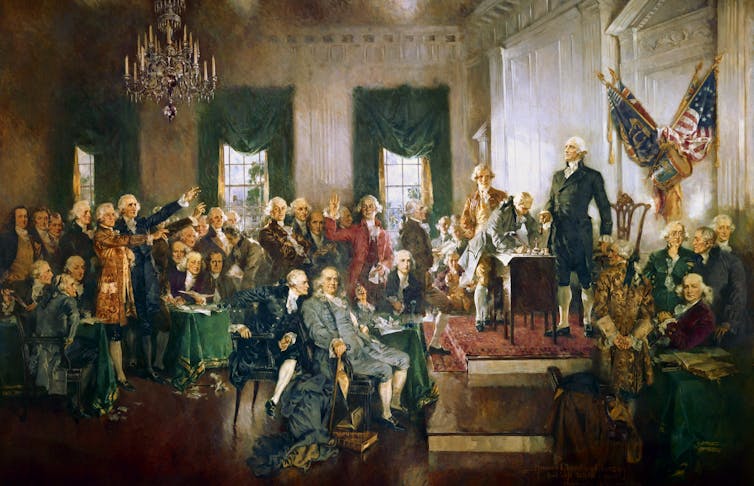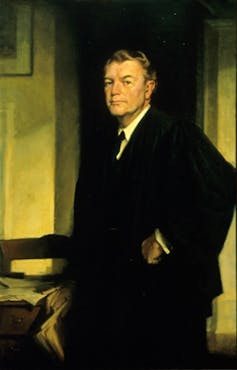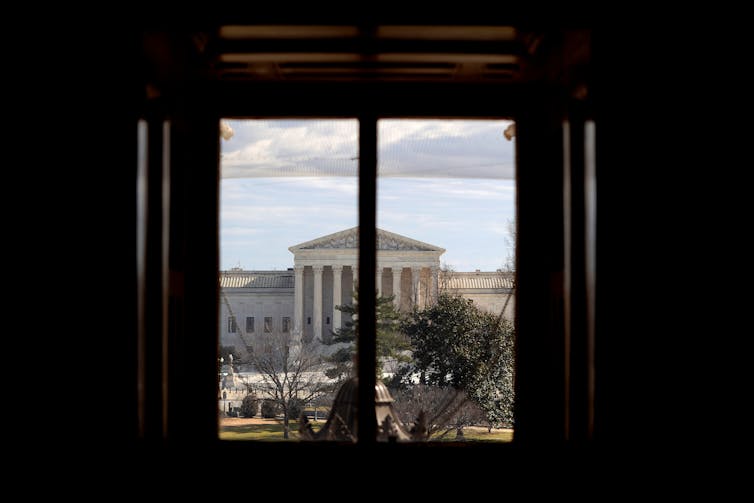Trump vs. Congress: The emergency declaration should not be resolved in court
- Written by William E. Nelson, Professor of Law, New York University
President Donald Trump’s emergency declaration to build a border wall has provoked a constitutional confrontation with Congress.
Here is the background for understanding what’s at stake – beginning more than two centuries ago.
A major problem for the framers at the Constitutional Convention in 1787[1] was how to create a presidency powerful enough to protect the nation, yet constrained enough to prevent a president from becoming a dictator.
Ultimately, the president was given power[2] to enforce the law, conduct foreign relations and command the armed forces. Congress retained most other key powers, including the power of the purse[3] and the power to declare war[4].
The framers knew they could not predict all that the future would bring. So they left the precise boundaries between presidential and congressional power unclear[5]. This imprecision in our checks and balances has served the nation well for 230 years because it provides the flexibility to govern while preventing tyranny.
As scholars of constitutional law[6] and history[7], we believe that President Trump’s assertion of a national emergency to build a wall along the Mexican border and the lawsuits filed in response[8] together threaten the very imprecision that has helped maintain constitutional checks and balances for more than two centuries.
To best maintain that balance, this confrontation should be resolved in the political realm, not in the courts.
 The signing of the Constitution of the United States.
Architect of the Capitol; Howard Chandler Christy, artist[9]
The signing of the Constitution of the United States.
Architect of the Capitol; Howard Chandler Christy, artist[9]
The national emergency
But the lawsuits over the emergency declaration will probably reach the Supreme Court, and the court might well hold Trump’s emergency declaration unconstitutional.
That would set a precedent that would unduly limit national emergency power that some future president may need.
Alternatively, the court could decide the lawsuits in Trump’s favor. That would invert the entire constitutional order, where Congress appropriates and the president spends. It would undercut the checks and balances provided by the framers and lead to an incredibly powerful presidency.
Either result the court reaches would set a bad precedent.
Congress can avert this problem.
The 1976 National Emergencies Act[10] gives Congress power to invalidate a president’s declaration of emergency by a resolution passed by simple majorities of both houses.
Nancy Pelosi, speaker of the House, announced that the House would vote Tuesday on a resolution to block the emergency declaration[11].
White House adviser Stephen Miller has already suggested that Trump would veto[12] any such resolution.
“He’s going to protect his national emergency declaration. Guaranteed,” Miller said on Fox News[13]. Both the House and the Senate would then need two-thirds majorities to override his veto.
We believe that for Congress to protect the constitutional order, its members must muster the necessary two-thirds majority.
To the court
If Congress does not override the president’s veto, the lawsuits will probably go to the Supreme Court. The court’s decision has strong potential to do harm to the historic constitutional balance.
That balance was upheld by the Supreme Court in a crucial decision more than 50 years ago.
On April 9, 1952, President Truman declared a national emergency[14]. In the midst of the Korean War, he seized the country’s steel mills on the eve of a nationwide strike because steel was necessary to make weapons. The steel companies immediately brought a lawsuit against the seizure in federal court.
Recognizing the importance of the issue, the Supreme Court heard arguments on May 12, and handed down its decision on June 2.
The court, in Youngstown Company v. Sawyer[15], rejected the president’s claim by a 6-3 majority.
 Supreme Court Justice Robert Jackson wrote a crucial opinion about presidential emergency power.
The Supreme Court, portrait by John C. Johnsen[16]
Supreme Court Justice Robert Jackson wrote a crucial opinion about presidential emergency power.
The Supreme Court, portrait by John C. Johnsen[16]
Justice Robert Jackson wrote an opinion proclaiming a general approach to the balance of powers between Congress and the president, rather than a fixed rule.
Jackson declared that[17] “when the President acts pursuant to an express or implied authorization of Congress, his authority is at its maximum.”
The president’s power, Jackson wrote, is in a “zone of twilight” when Congress has not spoken. When “the President takes measures incompatible with the expressed or implied will of Congress, his power is at its lowest ebb.”
President against Congress
President Trump is acting contrary to Congress’s will by appropriating money Congress has refused to appropriate. He signed a carefully constructed compromise budget bill[18] passed by more than veto-proof two-thirds majorities in both houses. He accepted the US$1.375 billion that the bill gave him for a border wall.
He then broke the deal by declaring a national emergency[19] to allocate an additional $6.7 billion to pay for border wall construction.
In two[20] important cases[21], the Supreme Court has broadly prohibited Congress from giving any of its appropriations authority or responsibility to the president – even voluntarily.
Congress’s adoption of a joint resolution seeking to invalidate Trump’s emergency declaration – an explicit statement of congressional will – would provide conclusive evidence that would only strengthen the argument that the president is acting contrary to Congress’s will.
 The Supreme Court building as seen from the U.S. Capitol in Washington.
REUTERS/Joshua Roberts[22]
The Supreme Court building as seen from the U.S. Capitol in Washington.
REUTERS/Joshua Roberts[22]
Preserving the constitutional balance
If the case gets to the Supreme Court, the president’s lawyers might argue that for Congress to decisively oppose an emergency declaration of the president, lawmakers must override his veto by a two-thirds vote.
Imposing such a veto override requirement, however, would eliminate the court’s role. That’s because a presidential declaration of emergency is immediately invalid if Congress overrides a presidential veto.
Two-thirds overrides are historically unlikely by Congress[23]. And requiring a two-thirds vote would give a president who declares a national emergency virtually unlimited power to appropriate money to his or her heart’s content – perhaps hundreds of billions of dollars to address, for example, climate change by subsidizing construction of wind farms.
Requiring Congress to override a presidential veto that protects a presidential appropriation would turn the appropriations power and the Constitution’s checks and balances inside out.
Congress has already spoken through passing the spending bill and will be considering a resolution to invalidate the president’s declaration of emergency.
Such a resolution, even if vetoed by the president, places President Trump’s declaration in Justice Jackson’s category where presidential power “is at its lowest ebb.”
It also preserves the historic flexibility by allowing the court’s decision to give deference to the votes of Congress in cases of claimed emergencies.
John Attanasio, a legal scholar and author of “Politics and Capital: Auctioning the American Dream[24],” is a contributing author.
References
- ^ Constitutional Convention in 1787 (www.jstor.org)
- ^ the president was given power (www.law.cornell.edu)
- ^ the power of the purse (history.house.gov)
- ^ the power to declare war (history.house.gov)
- ^ precise boundaries between presidential and congressional power unclear (theconversation.com)
- ^ constitutional law (global.oup.com)
- ^ history (global.oup.com)
- ^ lawsuits filed in response (www.washingtonpost.com)
- ^ Architect of the Capitol; Howard Chandler Christy, artist (www.aoc.gov)
- ^ 1976 National Emergencies Act (www.congress.gov)
- ^ block the emergency declaration (www.washingtonpost.com)
- ^ Trump would veto (www.washingtonpost.com)
- ^ Miller said on Fox News (www.vox.com)
- ^ President Truman declared a national emergency (www.history.com)
- ^ Youngstown Company v. Sawyer (www.loc.gov)
- ^ The Supreme Court, portrait by John C. Johnsen (www.oyez.org)
- ^ Jackson declared that (www.oyez.org)
- ^ signed a carefully constructed compromise budget bill (cdn.govexec.com)
- ^ by declaring a national emergency (www.cnbc.com)
- ^ two (www.loc.gov)
- ^ important cases (www.loc.gov)
- ^ REUTERS/Joshua Roberts (pictures.reuters.com)
- ^ unlikely by Congress (www.politico.com)
- ^ Politics and Capital: Auctioning the American Dream (global.oup.com)
Authors: William E. Nelson, Professor of Law, New York University

